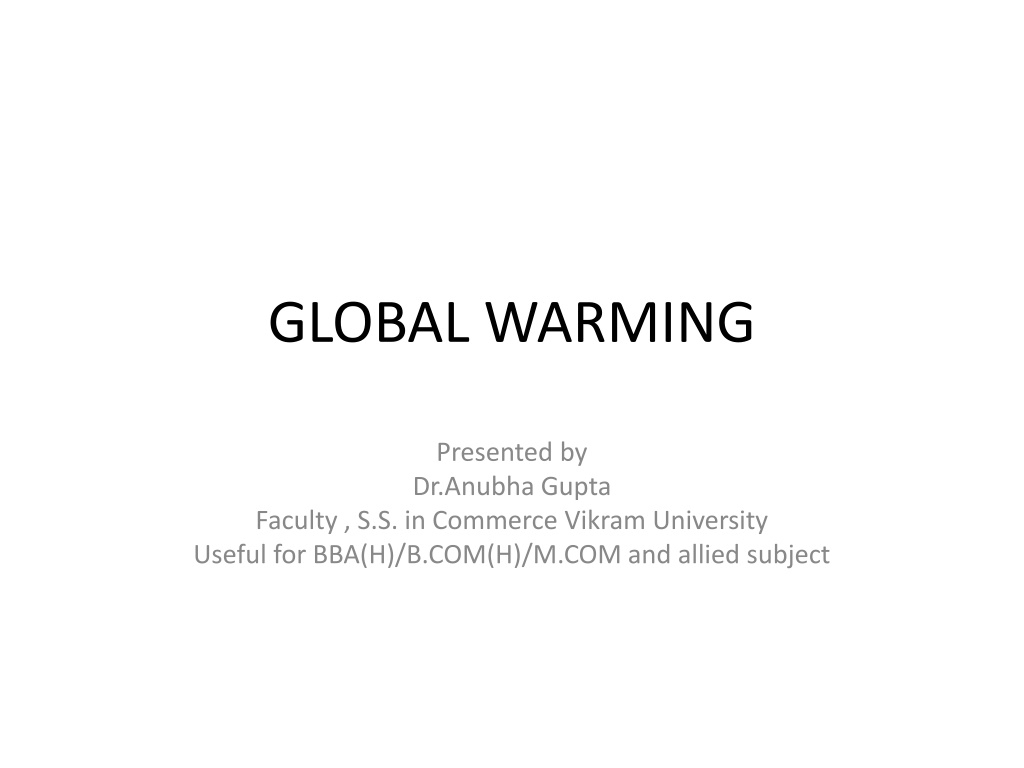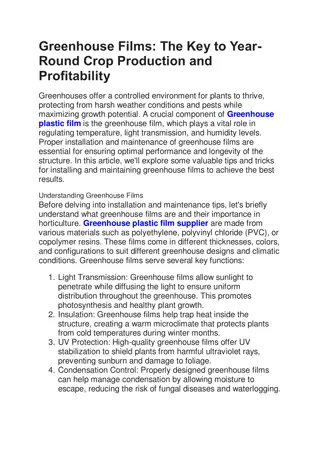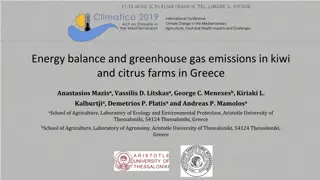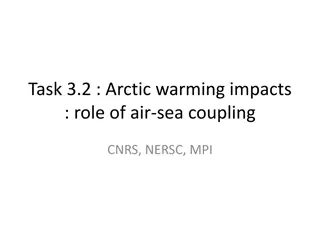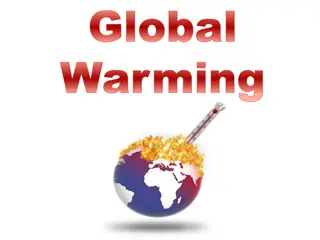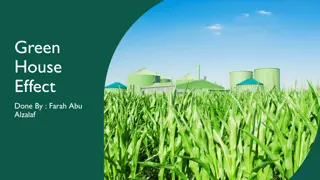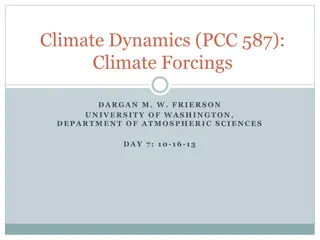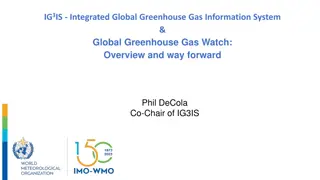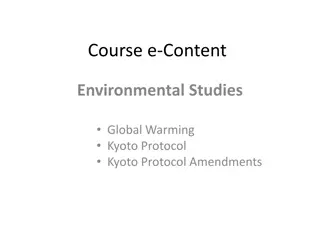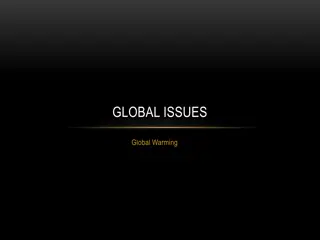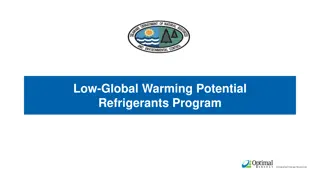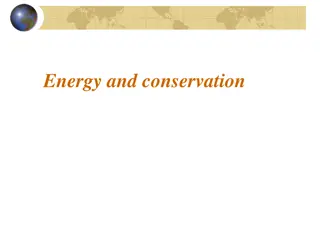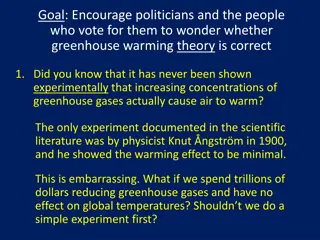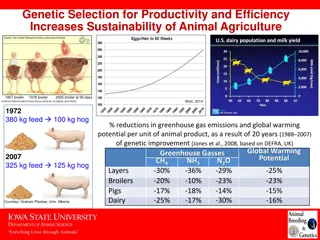Understanding Global Warming and the Greenhouse Effect
Scientists attribute the observed global warming trend to human activities that enhance the greenhouse effect, trapping heat in the atmosphere. The greenhouse effect, crucial for life on Earth, involves gases like water vapor and methane that contribute to warming. Nitrous oxide, another potent greenhouse gas, is produced through various practices. This information is essential for students of commerce, BBA, B.COM, and M.COM, helping them grasp the impacts of climate change on society and the environment.
Download Presentation

Please find below an Image/Link to download the presentation.
The content on the website is provided AS IS for your information and personal use only. It may not be sold, licensed, or shared on other websites without obtaining consent from the author. Download presentation by click this link. If you encounter any issues during the download, it is possible that the publisher has removed the file from their server.
E N D
Presentation Transcript
GLOBAL WARMING Presented by Dr.Anubha Gupta Faculty , S.S. in Commerce Vikram University Useful for BBA(H)/B.COM(H)/M.COM and allied subject
GLOBAL WARMING Scientists attribute the global warming trend observed since the mid-20thcentury to the human expansion of the "greenhouse effect" warming that results when the atmosphere traps heat radiating from Earth toward space. Certain gases in the atmosphere block heat from escaping. Long-lived gases that remain semi- permanently in the atmosphere and do not respond physically or chemically to changes in temperature are described as "forcing" climate change. Gases, such as water vapor, which respond physically or chemically to changes in temperature are seen as "feedbacks.
GREENHOUSE EFFECT Life on Earth depends on energy coming from the Sun. About half the light reaching Earth's atmosphere passes through the air and clouds to the surface, where it is absorbed and then radiated upward in the form of infrared heat.About 90 percent of this heat is then absorbed by the greenhouse gases and radiated back toward the surface. The greenhouse effect is a process that occurs when gases in Earth's atmosphere trap the Sun's heat. This process makes Earth much warmer than it would be without an atmosphere. The greenhouse effect is one of the things that makes Earth a comfortable place to live.
Gases that Contribute to The Greenhouse Effect Water vapor. The most abundant greenhouse gas, but importantly, it acts as a feedback to the climate. Water vapor increases as the Earth's atmosphere warms, but so does the possibility of clouds and precipitation, making these some of the most important feedback mechanisms to the greenhouse effect.
Gases that Contribute to The Greenhouse Effect Methane. A hydrocarbon gas produced both through natural sources and human activities, including the decomposition of wastes in landfills, agriculture, and especially rice cultivation, as well as ruminant digestion and manure management associated with domestic livestock. On a molecule-for-molecule basis, methane is a far more active greenhouse gas than carbon dioxide, but also one which is much less abundant in the atmosphere.
Gases that Contribute to The Greenhouse Effect Nitrous oxide. A powerful greenhouse gas produced by soil cultivation practices, especially the use of commercial and organic fertilizers, fossil fuel combustion, nitric acid production, and biomass burning.
Gases that Contribute to The Greenhouse Effect Chlorofluorocarbons (CFCs). Synthetic compounds entirely of industrial origin used in a number of applications, but now largely regulated in production and release to the atmosphere by international agreement for their ability to contribute to destruction of the ozone layer.
Gases that Contribute to The Greenhouse Effect Global warming occurs when carbon dioxide (CO2) and other air pollutants and greenhouse gases collect in the atmosphere and absorb sunlight and solar radiation that have bounced off the earth s surface. Normally, this radiation would escape into space but these pollutants, which can last for years to centuries in the atmosphere, trap the heat and cause the planet to get hotter. That's what's known as the greenhouse effect.
EFFECT OF GLOBAL WARMING Increase in average temperatures and temperature extremes More Droughts and Heat Waves & water shortages Changes in Precipitation Patterns Hurricanes Will Become Stronger and More Intense Melting glaciers & early snowmelt Sea Level Will Rise 1-4 feet by 2100 Arctic Likely to Become Ice-Free Extreme weather events Ocean Acidification damage agriculture and fisheries
The Influences of Human Activity on Climate Human activities are changing Earth's natural greenhouse effect. Burning fossil fuels like coal and oil puts more carbon dioxide into our atmosphere. NASA has observed increases in the amount of carbon dioxide and some other greenhouse gases in our atmosphere. Too much of these greenhouse gases can cause Earth's atmosphere to trap more and more heat. This causes Earth to warm up.
References https://www.nrdc.org/stories/global- warming-101 https://climate.nasa.gov/causes https://www.nationalgeographic.com/environ ment https://www.britannica.com/science/global- warming https://climatekids.nasa.gov/greenhouse- effect
. THANK YOU
